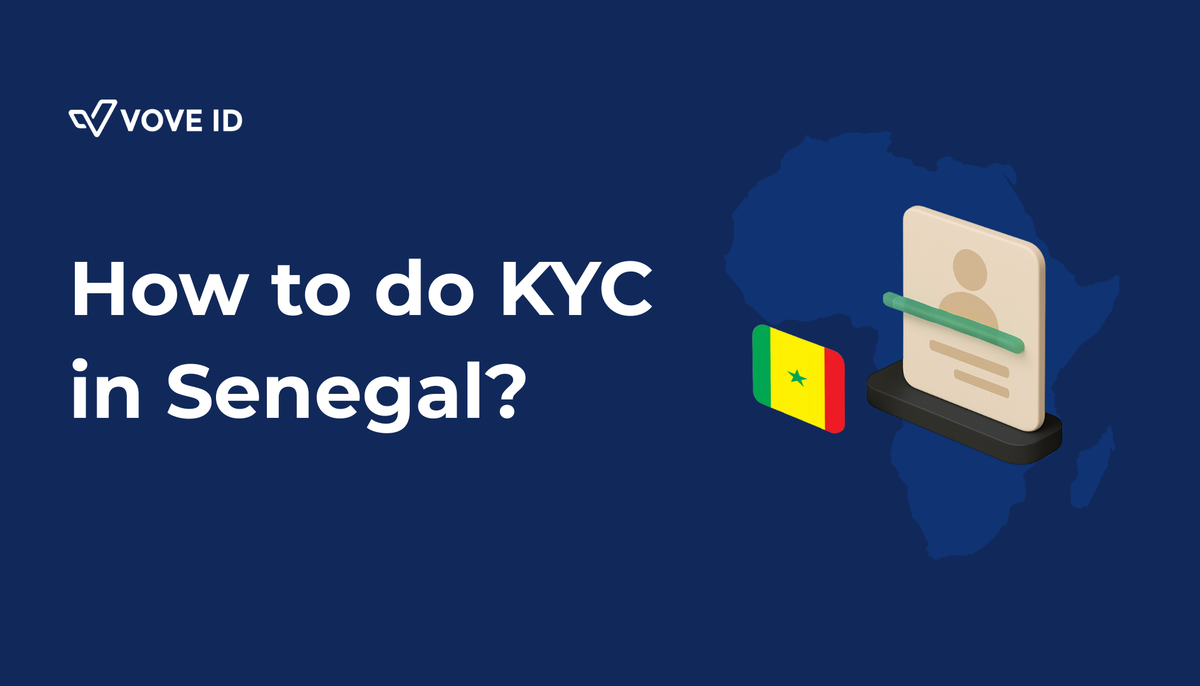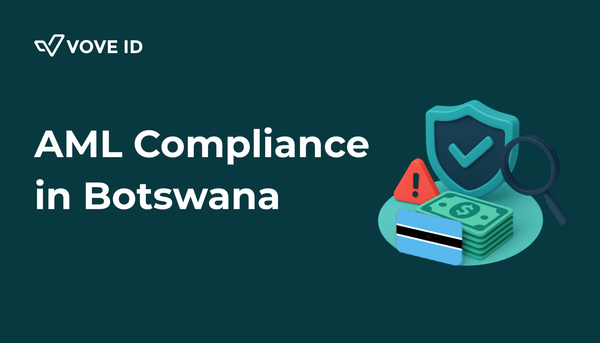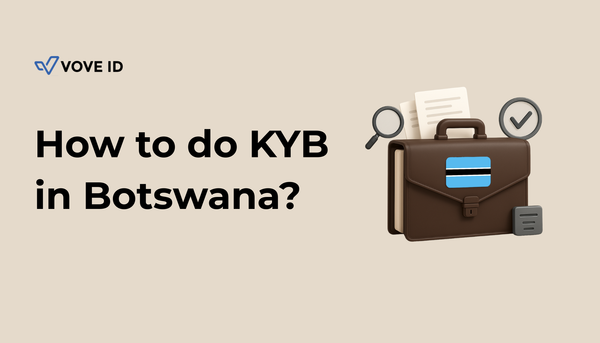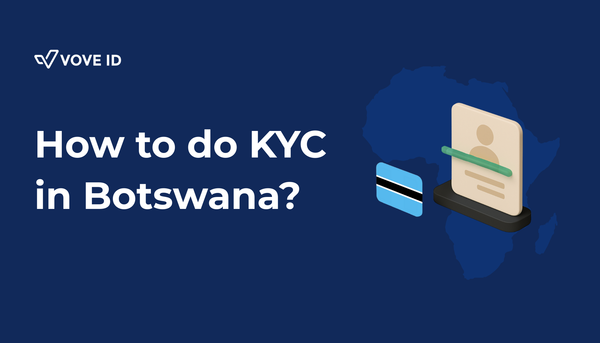KYC Compliance in Senegal: 2025 Guide for Fintechs and Regulated Businesses
Learn how fintechs and startups meet KYC, digital identity, and compliance requirements in Senegal with VOVE ID.

The Rise of Digital Finance in Senegal
Senegal has emerged as one of West Africa’s most dynamic digital economies. With a young, tech-savvy population and improving internet penetration (over 70% in urban areas by 2025), the country is experiencing explosive growth in fintech adoption. Mobile wallets like Orange Money and Wave dominate daily transactions, while innovative startups launch buy-now-pay-later (BNPL) platforms, micro-lending apps, remittance corridors, and even crypto-to-fiat gateways.
According to the BCEAO, mobile money transactions surpassed XOF 12 trillion in 2024, a 35% year-on-year increase. Remittances, a lifeline for millions of Senegalese families, now represent 9.5% of GDP, with digital channels capturing over 60% of inflows. Investors are taking note: Senegalese fintechs raised $180 million in 2024 alone, up from $95 million in 2023.
But with growth comes scrutiny. Regulators are no longer playing catch-up, they’re setting the pace. For fintech founders, compliance isn’t optional. Know Your Customer (KYC) and Anti-Money Laundering (AML) frameworks are now the bedrock of customer trust, investor confidence, and long-term scalability.
The good news for fintechs is that modern identity verification platforms like VOVE ID are making KYC compliance faster. By automating document verification, biometric checks, and sanctions screening, fintechs can onboard users in seconds (not days) while staying fully aligned with Senegal’s regulatory framework.
Founded to simplify digital compliance across Africa, VOVE ID enables regulated businesses to verify identities, detect fraud, and meet AML obligations at scale.
The Regulatory Framework: A Stronger, More Mature AML Regime
In recent years, Senegal has taken major steps toward building a stronger, risk-based compliance framework. The cornerstone remains Law No. 2018-03 of 23 February 2018, which established a comprehensive framework for preventing money laundering and terrorist financing. This was strengthened in early 2024 with Law No. 02/2024, which:
- Expanded the list of reporting entities to include fintechs, payment service providers, virtual asset service providers (VASPs), and real estate intermediaries.
- Introduced stricter penalties: fines up to XOF 500 million and imprisonment for up to 10 years for serious violations.
- Mandated risk-based Customer Due Diligence (CDD) and ongoing monitoring for all customer relationships.
At the operational level, the Cellule Nationale de Traitement des Informations Financières (CENTIF) functions as Senegal’s Financial Intelligence Unit (FIU). It receives, analyzes, and disseminates suspicious transaction reports (STRs) and coordinates with law enforcement. In 2024, CENTIF processed over 1,200 STRs, a 40% increase from the prior year.
Supervision is shared with the Banque Centrale des États de l’Afrique de l’Ouest (BCEAO), which issues binding directives for all WAEMU member states. Instruction No. 001-01-2023 requires financial institutions to implement automated transaction monitoring systems and conduct annual AML training.
Senegal is also a member of GIABA, the FATF-style regional body. After addressing 22 technical deficiencies, the country was officially removed from the FATF grey list in October 2024, a milestone that signals regulatory maturity and unlocks easier access to international capital.
What KYC Means in Practice
Individual KYC: From Paper to Pixels
Customer Due Diligence is mandatory for all client-facing financial services. For individuals, acceptable identity documents include:
- National ID card (CNI – Carte Nationale d’Identité)
- Passport
- Driver’s license
- Voter card (with photo and biometric chip)
For remote onboarding, biometric verification is strongly recommended: and in some cases, required. This includes facial recognition, liveness detection, and fingerprint matching against government databases (where available).
Fintechs must also screen customers against:
- Sanctions lists (UN, EU, OFAC, local)
- PEP databases
- Adverse media
Pro Tip: Use API-driven tools like VOVE ID to automate document OCR, biometric capture, UBO extraction, and real-time screening. Compliance becomes a feature, not a bottleneck.
Challenges Facing Fintechs and Startups
| Challenge | Impact | Mitigation |
|---|---|---|
| Cash-heavy economy | 60%+ of transactions still in cash; weak audit trails | Promote digital onboarding + cash-in incentives |
| Informal business sector | Many merchants lack formal registration | Accept alternative proofs (tax receipts, utility bills) |
| Limited database access | No real-time API to RCCM or CNI registry | Partner with licensed identity providers |
| Data quality variance | Older IDs lack chips; handwriting varies | Use AI-powered OCR + human fallback |
| Compliance talent gap | Startups can’t afford full-time COs | Outsource to RegTech platforms |
These pain points explain why automation is no longer optional: it’s a survival requirement.
Digital Identity, Mobile Money, and the Next Wave of Innovation
Senegal’s mobile money ecosystem is one of Africa’s most advanced. Over 30% of adults actively use mobile wallets, with Wave, Orange Money, and Free Money leading the pack. The government’s Digital Senegal 2025 strategy aims for 80% digital transaction coverage by 2030.
Key enablers include:
- National biometric ID rollout: 95% of adults now have a chip-enabled CNI
- BCEAO sandbox: allows fintechs to test innovative eKYC models
- UEMOA interoperability directive: enables cross-border digital payments
This creates fertile ground for embedded finance, agent banking, and BNPL expansion. But regulators expect proportional risk controls. A startup that skips KYC to boost growth will hit a wall when seeking bank partnerships or Series A funding.
That’s where AI + biometrics shine. Solutions like VOVE ID integrate:
- Document verification (100+ ID types, including Senegalese CNI)
- Facial biometrics with liveness detection
- Sanctions & PEP screening (updated daily)
- Audit-ready logs for CENTIF reporting
Result? Onboarding drops from 15 minutes to under 60 seconds, with 99.7% verification accuracy.
Over 80% of Senegalese adults now own a mobile money account, making the country one of West Africa’s digital payment leaders — but also a prime target for evolving AML regulations.
Why KYC Compliance Drives Growth (Not Just Compliance)
A robust KYC program signals:
- Operational maturity
- Risk awareness
- Scalability potential
It also reduces churn. Customers trust platforms that protect their data and funds. A single fraud incident can destroy years of brand-building.
Conclusion: Compliance as a Competitive Advantage
Senegal in 2025 is not a “frontier market” for compliance: it’s a regional benchmark. With modern laws, proactive regulators, and a thriving digital economy, the opportunity is massive.
But success belongs to those who build compliance into their DNA from day one.
VOVE ID empowers African fintechs and digital businesses to:
- Automate KYC workflows and reduce manual review time
- Onboard users in seconds with secure digital identity verification
- Align with Senegal’s evolving compliance framework and AML requirements
- Scale confidently across the WAEMU region with a unified verification infrastructure
Ready to turn compliance into growth?
👉 Discover VOVE ID and simplify KYC, accelerate onboarding, and scale securely in Senegal and beyond.




